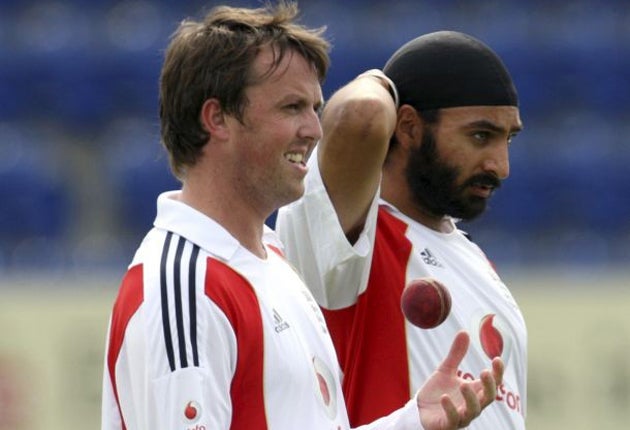England return to two spinners
The hosts are set to pick Swann and Panesar as they seek to repeat past glories

To secure their place in history England will today excavate the past. All the indications are that they intend to play two spinners in their initial assault on the Ashes which begin – at last – in Cardiff today.
It has been a wish that England have cherished since the blazing heat of Trinidad in March, a match which finished in a draw, but which Graeme Swann and Monty Panesar so nearly won by capturing 10 wickets between them. Throughout those five days, it was clear that the captain, Andrew Strauss, liked having them at his disposal.
The pair bowled well in tandem and it gave him options against left-handers and right-handers in equal measure. They are different in ways other than the obvious one – Swann bowls off-spin and Panesar orthodox slow left-arm – but they can both give it an appreciable rip in the right circumstances.
England last picked two spinners in a home Test against Australia in 1993, Mike Atherton's first as captain, and lost by eight wickets. The strategy has not been repeated since partly because they have spent the intervening years in a desperate and so far forlorn quest for a wrist spinner, which has been seen as the holy grail, and partly because the spinning cupboard has been bare of anything else much besides.
There remains time for a change of mind but cloud cover over Sophia Gardens this morning may not be enough alone to provoke it. Swann has taken to the international game as though it had been waiting for him, Panesar has never had much trouble taking Test wickets despite his perceived limitations.
Their choice still represents a huge gamble. The pitch is unknown – all pitches are unknown until somebody starts to bowl on them – and nothing in the surface, the weather or the ambience dictates that slow bowling should prevail. Strauss and coach Andy Flower are doubtless driven by the here and now, the fact that they believe the Cardiff pitch will take turn by the fourth day and that, contrastingly for once, Australia do not have a formidable spinner available.
But on each occasion England have regained the Ashes at home two spinners have played a prominent role. On the most recent occasion in 1985, off-spinner John Emburey and slow left-armer Phil Edmonds played together in five of the six matches and took 34 Test wickets between them. In 1953 various combinations of Roy Tattersall, Johnny Wardle, Jim Laker and Tony Lock (finally it was the latter two) brought back the Ashes.
So it was in 1926, when finally Greville Stevens, leg-spinner, and Wilfred Rhodes, left-arm, came together to help to prise the prize from Australian hands. And almost a quarter of a century earlier in 1902 it was leg spinner Len Braund and the same Rhodes.
This was a day that only a few weeks ago it was possible to predict would never happen in England again. The policy will probably not be pursued in every match of the series to come because there are bound to be pitches that simply do not warrant it and nobody knows for sure that Cardiff will assist as it is hoped it will by the fourth day.
But it would be highly welcome and merely reinforce the Ashes as a traditional force for much that is good about sport, cricket and Tests. The game is under pressure, it has changed immeasurably in the last 20 years for the better (there are far fewer draws than in the good old days) but it is under constant threat not only from other sports and other what may be called lifestyle choices but also from inside itself in the form of Twenty20.
Yet this Ashes contest has been so long-awaited that it is fully expected to ensure that in an ever-changing world some things are still sacred. It is difficult to believe that in 1926 or 1953 or 2005 the atmosphere was a febrile as it is now. And if England roll back the years by choosing both Swann and Panesar, adopting a bold course because boldness is necessary now, they may just spin themselves into a glorious future.
Alec's Ashes: Facts from the front line
Godfrey Evans's defiant innings at Adelaide in 1947 drew approval from the highest level. Having taken 95 minutes to get off the mark, he received a telegram from Winston Churchill: "Never did one man bat for so long for so little."
Subscribe to Independent Premium to bookmark this article
Want to bookmark your favourite articles and stories to read or reference later? Start your Independent Premium subscription today.

Join our commenting forum
Join thought-provoking conversations, follow other Independent readers and see their replies